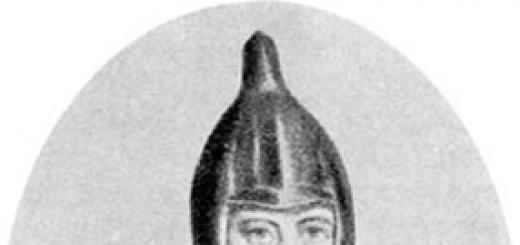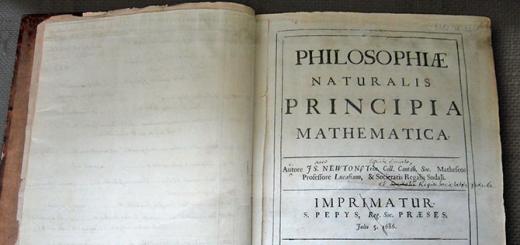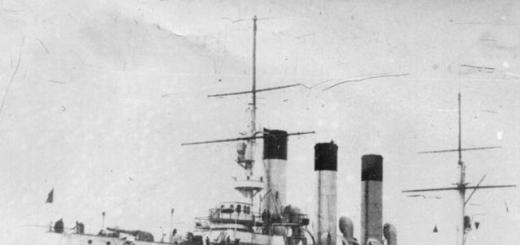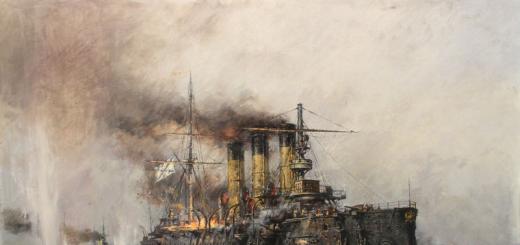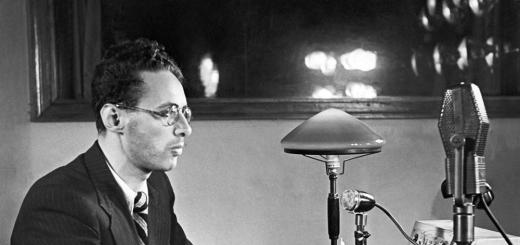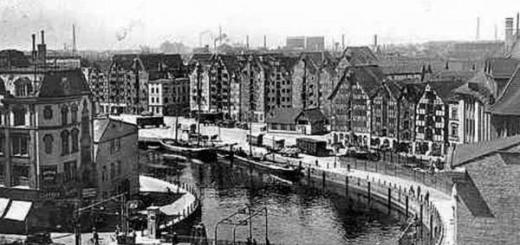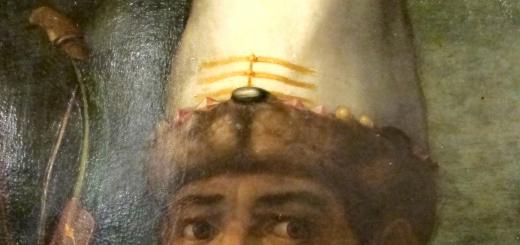Alexander Alexandrovich Blok. Born November 16 (28), 1880 in St. Petersburg, Russian Empire - died August 7, 1921 in Petrograd, RSFSR. Russian poet, classic of Russian literature of the 20th century, one of the greatest poets Russia.
A. Blok's father - Alexander Lvovich Blok (1852-1909), lawyer, professor at Warsaw University.
Mother - Alexandra Andreevna, nee Beketova, (1860-1923) - daughter of the rector of St. Petersburg University A. N. Beketov. The marriage, which began when Alexandra was eighteen years old, turned out to be short-lived: after the birth of her son, she broke off relations with her husband and subsequently did not renew them. In 1889, she obtained a decree of the Synod on the dissolution of marriage with her first husband and married a guards officer F. F. Kublitsky-Piottukh, while leaving her son the name of her first husband.
Nine-year-old Alexander settled with his mother and stepfather in an apartment in the barracks of the Life Grenadier Regiment, located on the outskirts of St. Petersburg, on the banks of the Bolshaya Nevka. In 1889 he was sent to the Vvedensky gymnasium. In 1897, finding himself with his mother abroad, in the German resort town of Bad Nauheim, Blok experienced his first strong youthful love for Xenia Sadovskaya. She left a deep mark on his work.
In 1897, at a funeral in St. Petersburg, he met with Vl. Solovyov.
In 1898 he graduated from the gymnasium, entered the law faculty of St. Petersburg University. Three years later he transferred to the Slavic-Russian department of the Faculty of History and Philology, from which he graduated in 1906. At the university, Blok met Sergei Gorodetsky and Alexei Remizov.
At this time, the poet's second cousin, later the priest Sergei Mikhailovich Solovyov (junior), became one of the closest friends of the young Blok.
Blok wrote his first poems at the age of five. At the age of 10, Alexander Blok wrote two issues of the Ship magazine. From 1894 to 1897, together with his brothers, he wrote the handwritten journal Vestnik.
Since childhood, Alexander Blok spent every summer in the estate of his grandfather Shakhmatovo near Moscow. 8 km away was the estate of Beketov's friend, the great Russian chemist Dmitry Mendeleev Boblovo. At the age of 16, Blok became interested in theater. In St. Petersburg, Alexander Blok signed up for a theater group. However, after the first success of roles in the theater, he was no longer given.
In 1909, two difficult events take place in the Blok family: the child of Lyubov Dmitrievna dies and the father of Blok dies. To recover, Blok and his wife leave to rest in Italy and Germany. For Italian poetry, Blok was accepted into a society called the Academy. In addition to him, it included Valery Bryusov, Mikhail Kuzmin, Vyacheslav Ivanov, Innokenty Annensky.
In the summer of 1911 Blok traveled abroad again, this time to France, Belgium and the Netherlands.
In 1912 Blok wrote the drama The Rose and the Cross. The play was liked by K. Stanislavsky and V. Nemirovich-Danchenko, but the drama was never staged in the theater.
On July 7, 1916, Blok was called to serve in the engineering unit of the All-Russian Zemsky Union. The poet served in Belarus. By his own admission in a letter to his mother, during the war his main interests were "food and horses."
Blok met the February and October revolutions with mixed feelings. He refused to emigrate, believing that he should be with Russia in hard time. In early May 1917, he was hired by the "Extraordinary Commission of Inquiry to investigate the illegal actions of former ministers, chief executives and other senior officials of both civil and military and naval departments" as an editor. In August, Blok began to work on a manuscript, which he considered as part of the future report of the Extraordinary Investigative Commission and which was published in the journal Byloe (No. 15, 1919) and in the form of a book called Last days Imperial Power” (Petrograd, 1921).
Blok immediately accepted the October Revolution enthusiastically, but as a spontaneous uprising, a revolt.
In early 1920, Franz Feliksovich Kublitsky-Piottuch died of pneumonia. Blok took his mother to live with him. But she and Blok's wife did not get along with each other.
In January 1921, on the occasion of the 84th anniversary of his death, Blok delivered his famous speech "On the Appointment of a Poet" at the House of Writers.
Blok was one of those artists of Petrograd who not only accepted Soviet power, but agreed to work for its benefit. The authorities began to widely use the name of the poet for their own purposes. During 1918-1920. Blok, often against his will, was appointed and elected to various positions in organizations, committees, and commissions. The ever-increasing volume of work undermined the strength of the poet. Fatigue began to accumulate - Blok described his condition of that period with the words "I was drunk." This, perhaps, also explains the creative silence of the poet - he wrote in a private letter in January 1919: "For almost a year since I did not belong to myself, I have forgotten how to write poetry and think about poetry ...".
Heavy workloads in Soviet institutions and living in a hungry and cold revolutionary Petrograd completely undermined the poet's health - Blok developed a serious cardiovascular disease, asthma, mental disorders appeared, and scurvy began in the winter of 1920.
In the spring of 1921, Alexander Blok, together with Fyodor Sologub, asked for exit visas. The issue was considered by the Politburo of the Central Committee of the RCP(b). The exit was denied. Lunacharsky noted: “We literally tortured him without releasing the poet and at the same time without giving him the necessary satisfactory conditions.” A number of historians believed that V. R. Menzhinsky also played a particularly negative role in the fate of the poet, forbidding the patient to travel to a sanatorium in Finland for treatment, which, at the request of Lunacharsky, was discussed at a meeting of the Politburo of the Central Committee of the RCP (b) on July 12, 1921 of the year. Produced by L.B. Kamenev and A.V. Lunacharsky at the subsequent meeting of the Politburo, the permission to leave on July 23, 1921 was belated and could no longer save the poet.
Being in a difficult financial situation, he was seriously ill and died on August 7, 1921 in his last Petrograd apartment from inflammation of the heart valves. A few days before his death, a rumor spread around Petersburg that the poet had gone mad. Indeed, on the eve of his death, Blok raved for a long time, obsessed with a single thought: were all copies of The Twelve destroyed. However, the poet died in full consciousness, which refutes the rumors about his insanity. Before his death, after receiving a negative response to a request to travel abroad for treatment (dated July 12), the poet deliberately destroyed his notes, refused to take food and medicine.
The poet was buried at the Smolensk Orthodox cemetery in Petrograd. The families of the Beketovs and Kachalovs are also buried there, including the poet's grandmother Ariadna Alexandrovna, with whom he was in correspondence. The funeral service was held on August 10 (July 28, old style - the day of the celebration of the Smolensk Icon of the Mother of God) in the Church of the Resurrection of Christ. In 1944, Blok's ashes were reburied at Literary bridges at the Volkovskoye cemetery.
Height of Alexander Blok: 175 centimeters.
Personal life of Alexander Blok:
In 1903, Blok married Lyubov Mendeleeva, daughter, the heroine of his first book of poems, Poems about the Beautiful Lady.
It is known that Alexander Blok had strong feelings for his wife, but periodically kept in touch with various women: at one time it was the actress Natalya Nikolaevna Volokhova, then the opera singer Lyubov Aleksandrovna Andreeva-Delmas.
Lyubov Dmitrievna also allowed herself hobbies on the side. On this basis, Blok had a conflict with Andrei Bely, described in the play "Balaganchik". Bely, who considered Mendeleev the embodiment of the Beautiful Lady, was passionately in love with her, but she did not reciprocate.
After another hobby, Blok's wife gave birth to a boy who lived only a few days. Despite the fact that this union was considered a laughingstock for all of St. Petersburg, it lasted until the death of the poet. After the First World War, relations in the Blok family improved, and in recent years the poet was the faithful husband of Lyubov Dmitrievna.

The poet's relatives live in Moscow, Riga, Rome and England. Before recent years Alexander Blok's second cousin, Ksenia Vladimirovna Beketova, lived in St. Petersburg. Among the relatives of Blok - Chief Editor magazine "Our Heritage" - Vladimir Enisherlov.
Date of birth: November 28, 1880
Date of death: August 7, 1921
Place of birth: St. Petersburg
Alexander Alexandrovich Blok- poet, Blok A.A.- one of the brightest representatives Silver Age.
Childhood
The father of the future poet, Alexander Lvovich, was engaged in jurisprudence. Mother, Alexandra Andreevna, was the daughter of the rector of the University of St. Petersburg. When little Sasha was only nine years old, his mother left his father, and gave preference to the Guards officer Kublitz-Piottukh. Since then, the poet's childhood was spent in the Grenada barracks, located not far from St. Petersburg.
Education
At the age of nine, Blok entered the Vvedensky gymnasium, after which he studied law at St. Petersburg University. True, after studying three courses, he is transferred to the Faculty of History and Philology.
creative way
Little Sasha became interested in poetry quite early. Already at the beginning of the twentieth century, he creates a surprisingly lyrical and musical cycle "Poems about the Beautiful Lady". In many ways, in its melodiousness, it even resembles romances.
But the poet does not stop there. His further work, in fact, is the transformation of personal views on the changes that are taking place around. In the cycle "City" we can see a number of sharp social problems, and in the "Snow Mask" - the problems of religion. " scary world"shows the author's views on the horrors of life, and the theme of punishment is very well disclosed in his works such as "Yambs" and "Retribution". About the look Russian Empire can be read in Rodina.
After his father dies, the poet decides to go to Italy with his wife. There he writes simply magical works, for which he is invited to become a member of the literary society "Academy". In this society there were such famous representatives of the Silver Age as Ivanov, Bryusov, Annensky.
From childhood, Alexander Alexandrovich was fond of the theater. In 1912 he even wrote the drama The Rose and the Cross. She incredibly impressed Nemirovich-Danchenko and Stanislavsky. But, unfortunately, it was never staged on the stage of the theater.
When the First World War began, Alexander was called up. Since 1916, he served in Belarus, in the engineering troops.
But the revolution in the poet caused a number of extremely contradictory feelings. On the one hand, he refused to emigrate, as many of his close acquaintances did, considering it a flight. On the other hand, he still could not accept everything that was happening around him inside himself. If you look at his work of that time, you can see that in many ways he supported the ideas of the Bolsheviks. Yes, and the new government, the young poet liked, and she began to actively use him. At first he was appointed to various positions, then they forced him to write a lot (even at a time when he himself did not want to). This attitude caused a serious breakdown in Blok's soul, and besides, because of this, the poet's health was shaken. Every day his health became more and more terrible.
In 1918, a very mysterious work "The Twelve" was published. The debate over this poem continues to this day. In the same year, Blok published a cycle of poems "Scythians", which becomes the final touch in his work. The author is exhausted and devastated, until his death he no longer wrote a single work.
In early 1919, Blok was arrested because he was suspected of an anti-Soviet conspiracy. Lunacharsky intercedes for him, and the poet is set free. But this event depresses the poet even more. A year later, his stepfather dies, and Blok takes his mother to live with him.
In 1921, during a meeting at the House of Writers, Blok delivered a speech "On the Appointment of a Poet." In the future, it will be turned into a piece of software.
In the early twenties Blok was broken even more than before. The constant cold and hunger, the eternal lack of money, too much physical exertion brought him to the appearance of serious heart problems, he began to develop asthma, scurvy appeared, and mental disorders began to appear. The poet urgently needed treatment, and in early spring he applied for a visa. He received permission, thanks to the fact that Gorky and Lunacharsky were trying to save him, but this happened only in the middle of summer, when it was too late. By that time, the poet had weakened so much that he was no longer able to go anywhere.
Personal life
From a young age, Alexander was a vulnerable and impressionable person. When he was 17 years old, he and his mother rested in Germany. There he met Ksenia Sadovskaya, who became his first, strong love. He dedicated more than one of his works to her.
Almost every summer, Blok traveled to Shakhmatovo, where his grandfather's estate was. Not far from the estate was the estate of the Mendeleevs. It was there that he met his future wife, the daughter of a famous chemist, Lyuba Mendeleeva. Their wedding took place in 1903. But this marriage cannot be called simple, each of the spouses had many hobbies on the side.
When talking about personal life Blok, in addition to his wife, they remember two more women for whom he had strong feelings. These are the actress Natalya Volokhova and the opera singer Andreeva-Delmas.
But by the end of his life, Blok received the greatest joy from relationships precisely in marriage. True, it did not last very long and ended with the tragic death of the poet.
Death
The poet died in his own Petrograd apartment on August 7, 1921. The official cause of death was valvular inflammation. Block was buried in the Church of the Resurrection of Christ. At first, he was buried at the Smolensk cemetery, but then he was reburied, this time at the Volkovskoye cemetery.
Important milestones in the life of Alexander Blok:
Born in 1880.
In 1889, a stepfather appeared in the life of the family.
From 1889 he studied at the Vvedensky gymnasium, from which he graduated in 1898.
The first serious love for K. Sadovskaya - 1897.
Since 1898, he studied at St. Petersburg University as a lawyer.
In 1901 he transferred to another faculty - historical and philological. Where he studied until 1903. In the same year, “Poems about the Beautiful Lady” were published.
1903 also marked a significant marriage to Lisa Mendeleeva.
In 1904, The City was published.
In 1907, the "Snow Mask" appears.
From 1907 to 1913 - "Retribution".
The Yambs were published from 1907 to 1914.
Cycle "Motherland" also from 1907 to 1916.
In 1908, The Terrible World begins to appear, and continues until 1916.
In 1909, his own father died. After that, the poet decides to leave for Italy with his wife for some time.
In 1911 travels to France.
His drama The Rose and the Cross comes out in 1912.
In 1913 he made another trip to France.
During the First World War, since 1916 he served in Belarus.
In 1918 his latest works poem "The Twelve" and "Scythians".
Suspicion of activities against the new government and arrest - 1919.
In 1920, his stepfather died.
In 1921 the last public speaking with a speech "On the Appointment of a Poet". Death.
The main achievements of the poet Alexander Blok:
It was his work that could end the poetic nineteenth century and begin the twentieth. It successfully combines classic motifs and the latest trends.
On the example of his own work, he showed an in-depth concept of symbolism.
All his work can be viewed as one huge cycle, such a grandiose poem in which you can follow the evolution of all the images, and how the poet sees them.
Interesting facts from the biography of Alexander Blok:
Blok made his first attempts to write poetry at the age of five.
Asteroid 2540 was named after him.
Blok's wife was not faithful to her husband. She often had affairs on the side. One of the most memorable is an affair with A. Bely. The poet was even going to challenge him to a duel, but his wife found the strength and left her lover. Alexander loved her very much and, in spite of everything, was glad that she had returned. Elizabeth also had an affair with Davidovsky, from whom she gave birth to a child. But shortly after birth, he died.
Block's mother and his wife could never get along and find mutual language.
Lines from his famous poem "Night, street, lamp, pharmacy" have become a real monument in the city of Leiden. They were applied to one of the buildings of the city, as part of the "Wall poems".
The life of one of the most famous poets of the Silver Age, Alexander Blok, is a series of extraordinary events. In a sense, it echoes the creative biography of his great contemporary -.
However, after the First World War, relations in the Blok family improved.
The beginning of Blok's active work is the period from 1900-1901. At this time, Alexander becomes a true admirer of the work of Afanasy Fet and Vladimir Solovyov, who played a significant role in Blok's biography in general, and in the formation of his personality in particular.
In addition, Blok had a chance to meet Dmitry Merezhkovsky and Zinaida Gippius, in whose publishing house, under the name "New Way", Alexander Alexandrovich first began to be published.
At the beginning creative way Blok was interested in literary symbolism. This direction, which influenced all types of culture, was distinguished by innovation, a desire for experimentation and a love of mystery.
After Blok began to be published in the New Way, his works began to be published in the Moscow almanac Northern Flowers.
Blok constantly visited a circle of young admirers of Vladimir Solovyov, held in Moscow. In the role of a kind of leader of this circle was the young poet Andrei Bely.
All members of the literary circle admired the work of Blok, with whom Bely himself became very friendly. However, this is not surprising, because he was passionately in love with the wife of Alexander Blok.
In 1903, a whole cycle of works by Alexander Blok "Poems about the Beautiful Lady" was published. Three poems by the young poet were included in the collection of works by pupils of the Imperial St. Petersburg University.
In his writings, Blok considered a woman as a source of purity and light. He also discussed how a genuine love feeling can bring an individual person closer to the whole world.
Revolution 1905-1907
The revolutionary events became for Alexander Blok the personification of the spontaneous and chaotic nature of life, and quite strongly influenced his biography in general, and his creative views in particular. love lyrics faded into the background.
Alexander Alexandrovich also showed himself as a playwright when he wrote his first play "Balaganchik". It was staged on the theater stage in 1906.
Despite the fact that Blok loved his wife, he allowed himself to show feelings for other women. For example, he had a passion for the actress N. N. Volokhova. The image of this girl formed the basis of many of his philosophical poems.
It was to her that Blok dedicated the cycle “Faina” and the book “Snow Mask”, and it was from her that he copied the heroines of the plays “King in the Square” and “Song of Fate”.
In fairness, it should be noted that Blok's wife also allowed herself hobbies. An interesting fact is that on the basis of this, Blok arose acute conflict with Andrei Bely.
At the end of the first decade of the 20th century, the main theme of the works of Alexander Alexandrovich was the problem of the relationship between the common people and the intelligentsia in society.
In the poems written during this period, one can notice a vivid crisis of individualism and attempts to determine the place of the creator in real life.
At the same time, Blok compared his homeland with the image of a loving wife, as a result of which his patriotic poems acquired a special and deep individuality.
Rejection of symbolism
In 1909, two tragedies occurred at once in the biography of Alexander Blok: his father and a newborn child from his wife Lyubov Dmitrievna died.
To recover from the shocks, he leaves for Italy with his wife. This trip made the poet rethink the values of life. The cycle “Italian Poems”, as well as notes from the book “Lightning of Art” tells about his internal struggle.
As a result of long reflections, Blok came to the conclusion that symbolism had lost interest for him and now he was more attracted to self-deepening and a "spiritual diet".
Due to changes in his creative biography, he concentrates on serious literary works and is less and less engaged in journalistic work. Moreover, he almost never appears at social events.
In 1910, the poet began to compose the poem "Retribution" to finish, which he did not succeed.
In the summer of 1911, Blok again went abroad, this time to, and. Alexander Alexandrovich gives a negative assessment of French morals:
An integral quality of the French (and the Bretons, it seems, par excellence) is the impenetrable dirt, first of all, physical, and then spiritual. It is better not to describe the first dirt; in short, a person of any squeamishness will not agree to settle in France.
In the same year he published a collection of works in 3 volumes.
In the summer of 1913, Blok again went to France (on the advice of doctors) and again wrote about his negative impressions:
Biarritz is flooded with the French petty bourgeoisie, so that even my eyes are tired of looking at ugly men and women ... In general, I must say that I am very tired of France and I want to return to a cultured country - Russia, where there are fewer fleas, almost no French women, there is food (bread and beef), drink (tea and water); beds (not 15 arshins wide), washbasins (there are basins from which you can never pour out all the water, all the dirt remains at the bottom) ...
In 1912-1913. from under his pen comes the famous play "Rose and Cross".
October Revolution
During this period, many famous poets and writers of that time, such as Dmitry Merezhkovsky and others, reacted very negatively to the arrival of the Bolsheviks.
However, Block did not see anything wrong with Soviet power and even agreed to cooperate with her. Thanks to this, the name of the famous poet was constantly used by new state leaders for selfish purposes.
At this time, Blok wrote the poem "Scythians" and the famous poem "The Twelve".
Personal life
The only wife in Blok's biography was Lyubov Mendeleev, whom he sincerely loved. His wife was his support and source of inspiration.
 Alexander Blok and his wife - Lyubov Dmitrievna Mendeleeva
Alexander Blok and his wife - Lyubov Dmitrievna Mendeleeva However, the writer's idea of marriage was rather peculiar. For example, he was categorically against intimacy, singing spiritual love and feelings.
It was also quite natural for Blok to fall in love with other women, although only his wife continued to be his only love. However, Blok's wife also allowed herself to have affairs with other men.
Unfortunately, no offspring appeared in the Blok family. And although Love gave birth to Alexander one child, he turned out to be weak and died very soon.
Poets death
After the October Revolution, the life of the poet began to decline, both spiritually and physically. Overloaded with various work and not belonging to himself, he began to get sick often.
He developed asthma, cardiovascular disease, and mental disorders began. In 1920 Blok fell ill with scurvy.
On August 7, 1921, due to endless illnesses and financial difficulties, Alexander Alexandrovich Blok died in his St. Petersburg apartment. The cause of the poet's death was inflammation of the heart valves. The block was buried at the Smolensk Orthodox cemetery.
Shortly before his death, he tried to get permission to travel abroad for medical treatment. However, it did not work out to get permission, which he himself sought.
Alexander Blok is considered one of the most significant figures in Russian poetry, who made a significant contribution to cultural heritage of his people.
If you liked short biography Blok - share it on social networks.
If you generally like the biographies of great people - subscribe to the site IinterestingFakty.org. It's always interesting with us!
Liked the post? Press any button.
Brief biography of the poet, the main facts of life and work:
ALEXANDER ALEKSANDROVICH BLOCK (1880-1921)
Alexander Alexandrovich Blok was born on November 16 (28), 1880 in St. Petersburg into a noble family. His father, Alexander Lvovich Blok, was a lawyer and professor at Warsaw University. Mother, Alexandra Andreevna Beketova, was the daughter of the botanist Andrei Nikolaevich Beketov, rector of St. Petersburg University.
Blok's parents separated on the eve of the birth of their son. Mother and Alexander settled in the grandfather's house. Sashura - that was the name of the future poet at home - forever retained the deepest spiritual attachment to Alexandra Andreevna. It was she who first noticed her son's abilities and for many years was his only adviser in literature. Alexander was the first to show her his initial creative experiments, trusted her advice and taste. And, by his own admission, the poet began to compose almost from the age of five and even published handwritten magazines for home.
In September 1889, Alexandra Andreevna married Lieutenant of the Life Guards of the Grenadian Regiment Franz Feliksovich Kublitsky-Piottukh. She left parental family and together with her son she moved to her husband's state-owned apartment on the territory of the regiment. Blok lived in the officer corps of the Grenada barracks for more than sixteen years.
Alexander began a life of two houses, as he was the favorite of both families. For the summer, the boy was usually taken to Shakhmatovo, the Beketov family estate near Moscow.
In 1891, Blok entered the Vvedensky gymnasium in St. Petersburg. He studied average - he was annoyed by the crowd. The time came, and the female part of the family became worried that the teenager did not pay attention to girls at all.
But in May 1897, after graduating from the penultimate class of the gymnasium, Alexander, together with his mother and aunt, left for the German resort of Bad Nauheim. And here at young man lover appeared. She was a beautiful dark-haired lady with a chiseled profile, clear blue eyes and a drawling voice. Her name was Ksenia Mikhailovna Sadovskaya. Sadovskaya was thirty-seven years old (!), and Alexander was seventeen. The lady just wanted to have fun, but Sashura fell in love sincerely.
They broke up a month later. Blok dedicated beautiful poems to his first woman, and that was the end of his passion. And for Sadovskaya, a short romance turned out to be the only strong feeling in life. The last, very dry letter the young man wrote to her was in 1901.
...Many years later, in civil war A very sick beggar old woman appeared in Odessa. When she died, twelve letters from Blok were found sewn up in the hem of her worn skirt. The insane beggar woman turned out to be Sadovskaya - the same blue-eyed goddess, dedicated to whom all of Russia was reading poems.
In 1898, the future poet entered the law faculty of St. Petersburg University. At the same time, Alexander Alexandrovich met with his future wife, Lyubov Dmitrievna Mendeleeva, the daughter of the great Russian scientist Dmitry Ivanovich Mendeleev, who at first glance made a huge impression on the young man.
One of the key events in Blok's life was his acquaintance in 1901 with the work of the philosopher and poet Vladimir Sergeyevich Solovyov. Under the influence of the idea of this thinker about the mystical Eternal Femininity, many young people of Russia lived at the beginning of the 20th century. They raved about the image of the Beautiful Lady and idolized their girlfriends at a distance, not recognizing sexual relations. They needed the Beautiful Lady to maintain their spirit and prayerful ecstasy. And to pacify the flesh, you could use the services of a prostitute.
The poet was also captivated by the idea of the embodiment of the Ideal in earthly reality. He believed in the possibility of contact between the ideal and real worlds. The expectation of a grandiose transformation was more and more closely connected in his mind with the descent to earth of the Eternal Femininity, the Mysterious Virgin.
After much thought, Alexander Alexandrovich realized that such a Virgo was Lyubov Mendeleev. Blok perceived his attitude towards the girl as a sublime "mystical romance." He asked for the hand of his beloved and on November 7, 1902 received consent. The wedding took place in August 1903. However, the marriage did not make Lyubov Dmitrievna happy. Blok loved her, but not as an earthly woman of flesh and blood, but as a Muse, a source of poetic inspiration. For four years after the wedding, his wife remained for him the Beautiful Lady - the earthly embodiment of the divine principle. Sexual relations with her were simply blasphemous for Blok. Mendeleev did not share her husband's point of view. She wanted to be loved like ordinary woman, and considered the behavior of Alexander Alexandrovich mocking.
The first years of the new century were marked for the poet by the beginning of friendship with Mikhail Sergeevich Solovyov ( younger brother Vladimir Solovyov) and his wife Olga Mikhailovna Solovyova (cousin of Blok's mother), with Zinaida Nikolaevna Gippius and Dmitry Sergeevich Merezhkovsky. Under the influence of these people, Alexander Alexandrovich became interested in religious, social and aesthetic problems.
In the journal "New Way", which was headed by Merezhkovsky, in 1903 the first selection of Blok's poems ("From Dedications") was published. In the same year, in the third book of the almanac "Northern Flowers", his poetic cycle "Poems about the Beautiful Lady" was published (the title was proposed by Valery Bryusov).
The first book by Alexander Blok appeared in October 1904 under the title Poems about the Beautiful Lady. With this edition, the poet summed up the romantic period of his work. A new stage began in Blok's work - realistic poetry.
This happened under the influence of a chain of tragic events both in the personal fate of the poet and in all of Russia.
On January 16, 1903, Mikhail Solovyov died of pneumonia. As soon as he closed his eyes, his wife went into the next room and shot herself. Blok, who was very close to the Solovyovs, took this as a landmark tragedy.
Soon began Russo-Japanese War, shamefully lost by the national bureaucracy and the jaded nobility. At the height of the war, the first Russian revolution of 1905-1907 took place with its Bloody Sunday and the utter impunity of those who brought the country to a desperate state.
On the social conflict Blok had a personal conflict. Blok became friends with Boris Nikolaevich Bugaev, an aspiring writer who appeared in magazines under the pseudonym Andrei Bely. He became a frequent guest in the house of the young Bloks, but over time it turned out that Boris was passionately in love with Lyubov Dmitrievna and was her husband's rival. The painful confusion in the relationship of the love triangle lasted three years, until in June 1905 Andrei Bely decided to confess his feelings to Lyubov Dmitrievna in a note. The woman did not attach any importance to this and that same evening, laughing, told her husband about the note.
In the poems of 1904-1906, the poet was looking for earthly values instead of the abstract dreams of youth. This is the time of the "Stranger" and just an oncoming woman, this is the world of the "visitor of night restaurants", the world of "Unexpected Joy" (as Blok called his second collection, published in 1907).
The book was accepted by the poet's recent associates - Andrei Bely and Sergei Solovyov - as sedition. They accused Blok of betraying the lofty ideals of youth, of abandoning the noble mission of the poet-theurge, called upon to transform the world. Alexander Alexandrovich responded to this criticism with a trilogy of "lyrical dramas" - "Balaganchik", "Stranger" and "King in the Square".
Only at the end of 1907 did Lyubov Dmitrievna finally break with Andrei Bely. During this time, the all-forgiving Blok himself passionately fell in love with the actress of the Meyerhold theater Natalia Volokhova. The woman was very spectacular - lean, black-haired, unsmiling and big-eyed. The poetic cycles "Snow Mask" and "Faina" are dedicated to her. The relationship of lovers from Lyubov Dmitrievna did not hide. The novel lasted almost two years and was interrupted by Blok.
Free relations were established between the spouses. Mendeleeva became interested in theater, began to play with Meyerhold and went on tour with his troupe to the Caucasus. Lyubov Dmitrievna wrote to her husband at length about each new novel, which she started “for the sake of boredom”, but at the same time assured: “I love you alone in the whole world.”
From the tour, the wife returned pregnant from the actor Dagobert. Blok accepted her joyfully and said: “Let there be a child. Since we don’t have it, it will be our common one ... ”A boy was born, he lived only eight days. Blok himself buried the baby and often visited the grave afterwards.
A trip to Italy in April 1909 was a turning point for Alexander Alexandrovich. The impressions made by him from this journey were embodied in the cycle "Italian Poems".
At the end of November 1909, Blok, having received news of his father's hopeless illness, went to Warsaw, but did not find him alive. The result of this trip and experiences was the poem "Retribution", on which Blok worked until the end of his life and which remained unfinished.
At the end of 1913, his last, all-consuming love came to the poet. At the performance of Jean Bizet's opera "Carmen" at the Theater of Musical Drama, he saw Lyubov Alexandrovna Andreeva-Delmas, who performed the main part. Blok was thirty-four years old, the same age was she. The poet dedicated the poetic cycle "Carmen" (1914) to the singer.
In 1914 the First World War. And in July 1916 Blok was drafted into the army. Until March 1917, the poet served near Pinsk as a timekeeper in the engineering and construction team. Shortly after the February Revolution, he was released on leave. In Petrograd, Alexander Alexandrovich was asked to edit the verbatim reports of the Extraordinary Commission of Inquiry. The result of this work, unusual for Blok, was the article "The Last Days of the Old Regime" (in an expanded version - the book "The Last Days of Imperial Power", 1921).
Blok almost never wrote poetry after 1916. He only republished previously created works.
The poet accepted the socialist revolution with enthusiasm. He addressed his readers with the article "The Intelligentsia and the Revolution", in which he issued an appeal: "With all your body, with all your heart, with all your consciousness - listen to the Revolution!"
And in 1918, the poem "The Twelve" was published, in which the revolution was consecrated by Jesus Christ. A passionate controversy flared up around the poem. Many of his friends decisively turned away from the poet, including S. M. Solovyov, Z. N. Gippius, D. S. Merezhkovsky.
The poem "The Twelve" and the poem "Scythians" (also created in 1918) summed up Blok's poetic work.
And then the poet began a severe spiritual crisis caused by disappointment in the revolution. Blok still worked on the commission for the publication of the classics of Russian literature; in the summer of 1920 he became chairman of the Petrograd branch of the All-Russian Union of Poets; performed with the reading of his poems.
The last lifetime book of the poet with the play "Ramses" was published in early 1921. In April, Alexander Alexandrovich began to have attacks of inflammation of the heart valves. On August 7, 1921, Alexander Alexandrovich Blok died in Petrograd.
Alexander Alexandrovich Blok (1880-1921)
By the end of the 90s of the 19th century, symbolism began to play the leading roles in Russian poetry. Russian symbolism has absorbed a wide variety of influences, ranging from the French decadents - Baudelaire, Verdun, Maeterlinck, Malarme, the English aestheticism of Oscar Wilde, the individualistic preaching of Ibsen and Nietzsche, and ending with the mystical philosophy of Vladimir Solovyov, the novels of Dostoevsky, the poetry of Tyutchev and Fet, the ideas of German romanticism .
One can trace a special connection between symbolism and Western decadence and single out different directions in Russian symbolism, but if we talk directly about Blok, then the key to understanding his poetry and, in general, to understanding the poetry of the “second generation” of Russian symbolists lies in the philosophy and lyrics of Vladimir Solovyov. The "second generation", or the Young Symbolists - V. Ivanov, A. Bely, Yu. Baltrushaitis, A. Blok, S. Solovyov - decisively dissociate themselves from the former "decadentism".
To the idea of solipsism, the doctrine of boundless self-love, calls to escape into the secluded world of dreams and elusive moods, passivity, extra-life, reverence for the image of death and the painfully perverted eroticism of Western decadence, they oppose the idea of catholicity, activity, the prophetic ministry of the poet, strong-willed aspirations to conduct into the life of his religious-philosophical idea.
“Dear friend, don’t you see that everything we see is only a reflection, only shadows from the invisible with our eyes?..” the world is all young symbolists. Vladimir Solovyov reveals the image of the "Princess", the mystical "World Soul", "Sophia", "Eternal Femininity", which received its highest development in Blok's "Beautiful Lady".
“The whole being of a person is captured not by events, but by symbols of another,” wrote Andrei Bely. And he also says: “Art should teach to see the Eternal; the impeccable, petrified mask of classical art has been torn off, shattered.
The essence of Russian symbolism was formulated by Vyach. Ivanov: “And so, I’m not a symbolist, if I don’t wake up with an elusive hint or influence in the heart of the listener of indescribable sensations, sometimes similar to the original memory (“And for a long time she languished in the world, full of wonderful desire, and boring songs could not replace the sounds of heaven earth"), sometimes to a distant, vague premonition, sometimes to the thrill of someone familiar and desired approach "... "I am not a symbolist if my words do not evoke in the listener a sense of connection between what is his "I" and what he calls “Not-I”, the connections of things empirically separated, if my words do not convince him directly of the existence of a hidden life, where his mind did not suspect life ... ”“ I am not a symbolist, if my words are equal to themselves, if they are not echoes of other sounds.
One can think a lot about the symbolism from which Alexander Blok came out, but the lines of the great Goethe come to mind:
Theory, my friend, is dry,
And the tree of life is forever green.
Indeed, the tree of life, the tree of poetry is forever green - you can not delve into the theory of symbolism, but get the greatest pleasure, always carry in your soul Blok's brilliant verses, from which life becomes, as it were, more vital and fuller, and more sublime. “Under the monotonous noise and ringing ...”, “Night, street, lamp, pharmacy ...”, “On valor. About exploits, about fame…”, “Oh, I want to live crazy…”, “We met with you at sunset…”, “The girl sang in the church choir…”, “Years have passed, but you are still the same…”, “Stranger”, “Oh, spring without end and without edge ...”, “She came from the cold ...”, “I bless everything that was ...”, “Do you remember? In our sleepy bay…”, “They will bury, they will bury deeply…”, “It’s raining and slush on the street…”, “May is cruel with white nights…”, “I am nailed to the tavern counter…”, “On the Kulikovo field”, “ Russia”, “Autumn Day”, “Kite”, poem “Twelve…”. These and many other works by Alexander Blok carry such poetic power, beauty, are so poignant that, of course, you admit that Blok is the most famous poet of the 20th century. He rises not only above his friends in symbolism, but also above all Russian poets of all currents and directions. Akhmatova, and Yesenin, and Klyuev, and Pasternak agreed with this ...
The beautiful poetry of Blok, perhaps, was carved out of that extraordinary contradiction that lived in the poet. On the one hand, one of Blok's main keywords was the word DEATH. Korney Chukovsky noted: “The very word“ death ”Blok then pronounced very emphatically, in his conversations it was more noticeable than all his other words.” The death of Messina, Halley's comet, the death of the Titanic - everything that is disastrous interested him, disturbed him. Blok wrote to A. Bely: "I love death, I loved it from time immemorial and remained with this love." But, on the other hand, it gave him the opportunity to feel life more sharply, its beauty, its music, its spring:
Oh, spring without end and without edge -
Endless and endless dream!
I recognize you, life! I accept!
And I greet with the sound of the shield!
I accept you, failure
And good luck, hello to you!
In the enchanted realm of weeping,
In the secret of laughter - there is no shame!
I accept sleepless arguments
Morning in the curtains of dark windows,
So that my inflamed eyes
Irritated, intoxicated spring!
I accept desert scales!
And the wells of earthly cities!
Illuminated expanse of heaven
And the languor of slave labor!
And I meet you at the threshold -
With a violent wind in snake curls,
With the undeciphered name of god
On cold and compressed lips...
Before this hostile meeting
I will never drop my shield...
You will never open your shoulders ...
But above them - a drunken dream!
And I look, and I measure enmity,
Hating, cursing and loving:
For torment, for death - I know -
Anyway: I accept you!
In general, there were a lot of polar ones in Blok, attracting different sides forces. This is what Daniil Andreev had in mind when he said about him that "a colossal poet has appeared, which has not been in Russia for a long time, but a poet with shadows of a serious spiritual illness on his face."
The topic of a separate and deep conversation is about the poet's striving for spiritual rejection, for the desire to be damned, spiritually dead, for the thirst for self-destruction, for a kind of spiritual suicide. This is especially vividly captured in the book "Snow Mask". But this is really a topic for a separate discussion. Whoever wants to delve into this topic can refer to Daniil Andreev's book "The Rose of the World", to the chapter "The Fall of the Messenger".
Alexander Alexandrovich Blok was born in St. Petersburg. His father was a law professor, his mother, the daughter of the famous botanist Beketov, was a writer. Early childhood passed in the house of his grandfather, the rector of St. Petersburg University. In the summer, Blok lived in his grandfather's estate - the village of Shakhmatovo, Klinsky district, Moscow province. Young Sasha was surrounded by a highly intelligent noble environment, which was close to literature, music, theater. After the gymnasium, Blok studied at St. Petersburg University, first at the Faculty of Law, then at the Faculty of History and Philology. He graduated from the university in 1908. In 1904, his first book, Poems about the Beautiful Lady, was published. Blok's lyrics of this time are painted in prayerful and mystical tones: real world the ghostly, otherworldly world, comprehended only in secret signs and revelations, is contrasted. In the following books, the image of the motherland, real Russian life, comes to the fore. Blok had a keen sense of time and history. He said: "In the verses of each poet, 9/10, perhaps, does not belong to him, but to the environment, era, wind."
The poet surrendered himself to this wind, the elements - and the wind of history carried him to the ocean of the Russian Revolution. For most poets, the shore of this ocean was seen in blood, in mud, but not for Blok. He accepted the revolution, and even rejoiced that the peasants burned their richest library in Shakhmatovo. The poet considered this a fair retribution for centuries of serfdom. With genuine genius, the poet captured and embodied in the famous poem "The Twelve" the elements of the revolution. Read his articles "Intelligentsia and Revolution", "Art and Revolution". Everyone remembers Blok's call: "Listen to the music of the Revolution!" The poet wrote in his diary: “After all, it’s only blood, atrocities, and then clover, pink porridge ... When shackling with iron, do not lose this precious riot, this tirelessness.”
One can, of course, say that Blok was profoundly mistaken. But everything that happened in Russia in those years can also be understood as an inevitable hurricane from everything accumulated in Russian history. It’s another matter to meet him joyfully or cry, but nothing can be changed. Blok accepted the elements as redemption, as a challenge to stagnation. You can argue as much as you like about Christ at the end of The Twelve, but you can’t ignore the point of view that “In a white halo of roses / In front is Jesus Christ” - this is after all a normal Christian view of what happened, that everything is from God, that nothing here is done without His will or permission.
Blok is a world-class lyricist. The lyrical image of Russia, a passionate confession of bright and tragic love, the image of St. Petersburg, the "tearful beauty" of the villages, the majestic rhythms of Italian poetry - all this wealth has flowed into Russian poetry like a wide, full-flowing river.
Several versions are connected with Blok's death. One of them, that he died of starvation, another, that the Bolsheviks poisoned him, the third, that he "fell ill all over", "all over", like Apollon Grigoriev - these are the words of Remizov. They say that before his death, Blok broke the bust of Apollo in his hearts, they say, he cursed the beauty that brought him so much pain ...
And yet, nevertheless, it was Alexander Blok who said: “Erase random features, / And you will see, the world is beautiful!”
Another thing is at what cost random features are erased.
* * *You read the biography (facts and years of life) in a biographical article dedicated to the life and work of the great poet.
Thanks for reading. ............................................
Copyright: biographies of the lives of great poets
Russian poet, playwright, critic, translator. Alexander Alexandrovich Blok was born November 16 (28), 1880. Father, A.L. Blok, - lawyer, professor of law at Warsaw University; mother, A.A. Kublitskaya-Piottukh (née Beketova), daughter of the rector of St. Petersburg University A.N. Beketova, translator. The parents separated immediately after the birth of the child. A. Blok's childhood passed in his grandfather's house. Among the most vivid childhood and youthful impressions are the summer months spent in the Beketovs' estate near Moscow - Shakhmatovo.
In 1897 during a trip to the resort of Bad Nauheim (Germany), Blok experienced the first youthful passion of K.M. Sadovskaya, to whom he dedicated a number of poems, which were then included in the cycle “Ante Lucem” (“Before Dawn”), in the collection “Beyond the Past Days” ( 1920 ), as well as in the cycle "In twelve years" ( 1909-1914 ). In 1906 Graduated from the Faculty of History and Philology of St. Petersburg University. In 1903 Alexander Blok married the daughter of D.I. Mendeleev - Lyubov Dmitrievna. He began to write poetry at the age of five, but conscious adherence to a poetic vocation begins from 1900-1901.
The most important literary and philosophical traditions that influenced the formation of Blok's creative individuality are the lyrics and philosophy of Vl.S. Solovyov, the philosophy of Plato, the poetry of A. Fet. In 1902 Blok meets Z. Gippius and D. Merezhkovsky, who had a huge impact on him; in the same period, his rapprochement with the circle of symbolists begins. Blok’s creative debut is the poetic cycle “From Dedications” (female “New Way”, 1903 , № 3). In 1904 in the publishing house "Grif" the first book by A. Blok "Poems about the Beautiful Lady" was published (on title page - 1905 ), where the traditional romantic theme of love-service received a new content, brought into it by the ideas of Vl.S. Solovyov about merging with the Eternally Feminine and Divine All-Unity, about overcoming the alienation of the individual from the world whole through a loving feeling.
The revolutionary events made a great impression on Blok. 1905-1907 gg. in the lyrics of this time, the theme of the fatal element becomes the leading one; the image of the central heroine changes dramatically: the Beautiful Lady is replaced by the demonic Stranger, the Snow Mask, the “gypsy schismatic” Faina. Blok is actively involved in literary life, published in periodicals ( since 1907 leads the critical department in the magazine "Golden Fleece"), unexpectedly for his fellow symbolists, revealing an interest in and closeness to the traditions of democratic literature. Since 1905 regularly attends literary meetings Vyach.I. Ivanova, 1906 - on "Saturdays" in the theater of V.F. Komissarzhevskaya, V.E. Meyerhold puts on his first play "Puppet show" ( 1906 ). The actress of this theater N.N. Volokhova becomes the subject of his stormy passion, the book of poems "Snow Mask" is dedicated to her ( 1907 ), the cycle of poems "Faina", her features determine the appearance of "natural" heroines in the dramas of this period ("The Stranger", "The King in the Square", both 1906 ; "Song of Destiny" 1909) . Collections of poems "Unexpected Joy" are published ( 1907 ), "Earth in the snow" ( 1908 ), plays "Lyric Dramas" ( 1908 ). Blok makes presentations at the St. Petersburg Religious and Philosophical Society (“Russia and the Intelligentsia”, 1908 ; "Element and culture", 1909 ). The key themes of A. Blok's work of this period are the people and the intelligentsia, the crisis of individualism, the place of the artist in modern world. The controversy around Blok's articles, the growing realization by Blok himself that a direct appeal to a broad democratic audience did not take place, leads him in 1909 to disappointment in publicistic activity.
A revision of values occurs during a trip to India spring and summer 1909: against the background of the political reaction in Russia and the complacent European philistinism, the only saving value for Blok is high classical art, the enthusiasm for which was reflected not only in the cycle "Italian poems" ( 1909 ) and in the unfinished book of prose essays The Lightning of Art ( 1909-1920 ), but also in the report “On state of the art Russian symbolism" ( 1910) . Inheritance after father's death at the end of 1909 freed Blok from worries about literary earnings and made it possible to focus on a few major artistic ideas. Since 1910 he begins to work on a large epic poem "Retribution" (not completed) - a story of the collapse of family ties, the loss of a home, the alienation of a son from his father, spiritual fall and betrayal of ideals. In 1912-1913. Blok writes the play "Rose and Cross".
After the release of the collection "Night Hours" ( 1911 ) A. Blok reworked his 5 poetry books into a three-volume collection of poems (vols. 1-3, 1911-1912 ). Since that time, Blok's poetry has existed in the minds of readers as a single "lyrical trilogy", a "novel in verse", creating a "myth about the path". During the life of the poet, the three-volume edition was reprinted in 1916 and 1918-1921. AT 1921 A. Blok began preparing a new edition, but managed to complete only the first volume. Each subsequent edition included everything significant that was created between editions: the Carmen cycle ( 1914 ), dedicated to the singer L.A. Andreeva-Delmas, the poem "The Nightingale Garden" ( 1915 ), poems from the collections "Yamba" ( 1919 ), "Gray morning" ( 1920 ).
Since autumn 1914 Blok worked on the publication of "Poems of Apollon Grigoriev" ( 1916 ) as a compiler, author introductory article and commentator. In 1916 was drafted into the army, served as a timekeeper of the 13th engineering and construction team of the Zemsky and urban unions near Pinsk. After the February Revolution 1917 returned to Petrograd, was a member of the Extraordinary Investigative Commission to investigate the crimes of the tsarist government as an editor of verbatim reports. After the October Revolution 1917 unambiguously declared his position, answering the questionnaire "Can the intelligentsia work with the Bolsheviks" - "Can and must." Blok's position provoked a sharp rebuke from Z. Gippius, D. Merezhkovsky, Vyach. Ivanov, A. Akhmatova and many others. others In January 1918 Blok published a series of articles “Russia and the Intelligentsia” in the Left SR newspaper “Znamya Truda”, and in February - the poem “The Twelve” and the poem “Scythians”.
After 1918 Blok wrote comic poems “just in case”, prepared the last edition of the “lyrical trilogy”, but did not create new original poems until before 1921. FROM 1918 there was a new upsurge in Blok's prose work. The cycle "Russia and the Intelligentsia" was published as a separate book ( 1918, 1919 ). He delivered cultural-philosophical reports at the Free Philosophical Association (“The Collapse of Humanism”, 1919 ; "Vladimir Solovyov and our days", 1920 ), School of Journalism (Catilina, 1918 ), wrote lyrical fragments (“Neither dreams nor reality”, “Confessions of a pagan”), feuilletons (“Russian dandies”, “Compatriots”, “Answer to the question about the red seal”). After the revolution, A. Blok was forced to seek not only literary earnings, but also public service. In September 1917 became a member of the Theater and Literary Commission, from March 1918 served in the Repertory Section of the Theater Department of the People's Commissariat of Education, in April 1919 moved to the management of the Bolshoi Drama Theatre. At the same time, a member of the editorial board of the publishing house "World Literature" under the leadership of M. Gorky, since 1920 representative of the Petrograd branch of the Union of Poets. An image of culture appears in his articles and diary entries. Lost in the catacombs. A. Blok's thoughts about the indestructibility of true culture and the "secret freedom" of the artist, opposing the attempts of the "new mob" to encroach on it, were expressed in the article "On the Appointment of the Poet" and the poem " Pushkin House» ( February 1921), which became his artistic and human testament.
